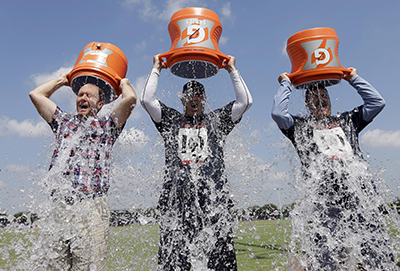
Source: www.nbcnews.com
Have you done the ice bucket challenge yet? By the time this article is published many people I know on my social media, including my friends and family have done it. Even children, elderly men and women join in the fun to spread the awareness. Some were famous celebrities but many were ordinary people like you and me. It is so heartwarming to see so many people enthusiastically contribute to the cause.
Yet, despite many people doing the ice bucket challenge, many are not aware how the disease actually inspired the challenge. On the other hand, some do not even realisethat we also have patients living with ALS or amyotrophic lateral sclerosis (more commonly known as MND or motor neuron disease) here in Malaysia.
So – what is MND (motor neuron disease)?
MND happens when the nerves that control your muscle function starts to degenerate or die off. Can you imagine not having your body to move the way that you desired? When these nerves die off – our brain cannot send signals to get our muscle to move and when these signals cannot be transmitted effectively to the muscle, the muscles start to become weaker.
When this happens, you would start to have difficulty to do even simple routine movements that you do everyday such as swallowing, talking, walking, picking up things and even breathing. At one point, you may feel like your body is frozen and this is how the ice bucket challenge simulates how one’s feel to be frozen like a person with MND.
People living with MND progress differently. Some progress very slowly, some progress really fast. For some individual, the disease may only affect his speech and swallowing.. People diagnosed with motor neuron disease that affects the breathing muscles can die due to respiratory failure .There are also individual that die due to complications from being immobile i.e aspiration pneumonia, wide spread infection from urinary tract or pressure sores.
What should I do if I or someone I know get diagnosed with MND?
- Seek treatment. The current available treatment for MND aimed to relieve symptoms, slow down the progression of disease and to avoid complications like aspiration pneumonia as well as pressure sores. As people living with MND progress differently, they need personalised care by multidisciplinary teams which should include primary care physician, neurologist, palliative care physician, occupational therapist, speech therapist, physiotherapist, a specialised nurse and social worker.
- Get support. Coping with MND can take a heavy toll for everyone involved; especially patients and caretakers. You can find support group online Find courage from them and be inspired by those who continue to battle this disease.
- Be empowered by making decisions in advance on how you want your end of life care be. Many patients living with MND would make decisions regarding future treatment decisions earlier in case they can’t communicate decision later because of the disease progress. Advance planning can be made on issues like where do you want your treatment to be (home/ hospice/hospital), whether do you want to be resuscitated by artificial means (like when you cannot breath on your own and needed a breathing tube inserted into your throat), do you like to donate your organs once you die or whether you want a feeding tube inserted once you no longer be able to swallow on your own.
- For family members and caretaker of people living with MND, knowing and supporting their advance care plans are important to ensure their wishes and rights are respected. Caretakerstoo can help by advocating on behalf of the patient and communicating this advance care plans to the managing health care team.
Despite there is no absolute cure for MND, people living with MND can still live a long, positive, and productive life with good medical care. Quoting the famous physicist Stephen Hawking in 2010, “When I was first diagnosed with ALS, I was given two years to live. Now 45 years later, I am doing pretty well.”
In fact this year, he turned 72 years old. A living proof that one can live life to the fullest despite MND diagnosis.
Good MND online resouces
- MND Malaysia Facebook support group https://www.facebook.com/groups/mndmalaysia/
- MND Association http://www.mndassociation.org
- ALS Association http://www.alsa.org
Dr. Nur Hidayati is in training to be an internal medicine specialist with special interest in infectious disease and nephrology. She is a permanent columnist for the Malaysian Medical Gazette. Learn more about her on The Team page.
[This article belongs to The Malaysian Medical Gazette. Any republication (online or offline) without written permission from The Malaysian Medical Gazette is prohibited.]
